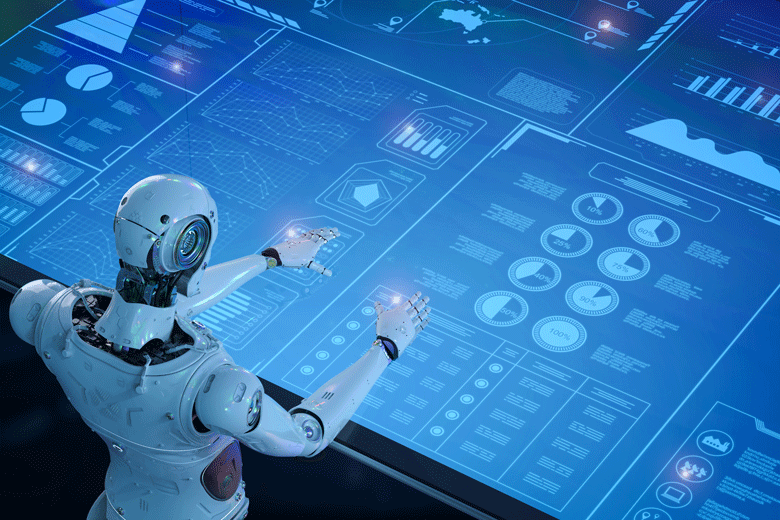

Artificial intelligence (AI) is outperforming humans in an increasing number of tasks and is likely to replace humans in more and more jobs. In the Middle East, 50 per cent of the CEOs surveyed for the 2019 Mercer Global Talent Trends believed that more than 20 per cent of current jobs will cease to exist in the next five years.
Governments in the region have been quick to realise the power of innovation as a way to transition from their resource-based economies to knowledge-based ones.
 The UAE has witnessed extraordinary digital transformation, with a strong government focus on developing the required digital infrastructure through both public spending and private investment.
The UAE has witnessed extraordinary digital transformation, with a strong government focus on developing the required digital infrastructure through both public spending and private investment.
The country created headlines with the appointment of the world’s first minister of state for AI in 2017, and, most recently, witnessed the largest tech sector transaction in the region with Uber Technologies’ $3.1bn acquisition of the local Careem.
The UAE has also emerged as a startup hub for the financial sector, hosting about 30 per cent of the region’s fintech firms as well as e-commerce giants such as Souq, Noon and Namshi. Together with a surge in digital banking and fintech, the country’s tech-savvy businesses are at the forefront of a regional wave of innovation.
Saudi Arabia’s Vision 2030 agenda is equally committed to bringing innovative technologies to the kingdom. Saudi-based Elite for Construction & Development Company, for example, has purchased the Bod 2 Printer, described as the world’s largest 3D construction printer.
Wide-ranging impact
Socioeconomic concerns exist, of course, with the top three in the region being talent migration, cybersecurity and changes in business regulations. Nevertheless, as the latest World Economic Forum Mena event at the Dead Sea in Jordan made clear: the digital revolution is redefining work as we know it, impacting the workforce’s size, shape and skill sets.
While many jobs as we know them today might not exist in the near future, the World Economic Forum predicts that AI could also introduce about 58 million jobs to the landscape in a significant recalibration of the workforce.
Workforce reductions are anticipated in the technology, insurance and energy industries, but in other sectors the reverse will happen as greater demand for new products and services increases.
In the Middle East, 65 per cent of companies plan to increase their use of automation within the workplace this year alone.
At the same time, automation and new ways of working will provide opportunities for jobs to evolve. As skill sets change, companies will seek out candidates who demonstrate greater cognitive maturity and empathy. Creative thinking, learning agility and technological skills will be in demand.
Workplace transition
There will also be a shift towards flexible work places, with 79 per cent of Middle East C-suite executives believing that contingent workers will substantially replace full-time employment in their organisations in the coming years.
 The greatest challenge will be sourcing the talent pool that will drive the future of work. As businesses and organisations plan for their transformation, it is imperative that they examine it through a talent lens.
The greatest challenge will be sourcing the talent pool that will drive the future of work. As businesses and organisations plan for their transformation, it is imperative that they examine it through a talent lens.
If the organisation decides to re-skill existing resources, there needs to be a clear strategy that maps out the transformation, identifies new skills and training requirements, and creates partnerships with educational institutions to facilitate the transition.
Boosting morale
The future of work has traditionally relied on a strategy that requires organisations to buy resources by shopping for the best talent, build a workforce through reskilling or upskilling, and borrow talent by outsourcing functions and operations on a temporary basis.
Throughout any transformation, however, it is crucial that employees’ morale remains positive, as individuals tend to have the greatest affinity towards the company they work for – more than the profession, team, function or boss.
During the process of transformation, organisations must communicate effectively with their workforce and show their employees a vision for their future.
The questions that typically weigh on an employee’s mind are about her or his future: What’s in it for me? What will my role be in the future? How will the organisation train me so I don’t feel threatened?
To this end, organisations need to explain the changes ahead clearly and with maximum transparency. This means outlining the transformation journey and the parts of the business most vulnerable to automation and technology, and subsequently workforce changes.
Progressive companies are being honest about the scope and scale of change. The most progressive are doing this hand in hand with their employees, so their employees know how their role will change in the future and are actively preparing themselves for that future.
About the author
 Nuno Gomes leads Mercer’s Talent line of business for the Middle East, North Africa and Turkey (MENAT) region
Nuno Gomes leads Mercer’s Talent line of business for the Middle East, North Africa and Turkey (MENAT) region
You might also like...

Partanna and Saudi firm tests carbon negative concrete
25 April 2024

Hassan Allam and Siemens confirm Hafeet Rail award
24 April 2024

UAE builds its downstream and chemical sectors
24 April 2024

Acwa Power eyes selective asset sales
24 April 2024
A MEED Subscription...
Subscribe or upgrade your current MEED.com package to support your strategic planning with the MENA region’s best source of business information. Proceed to our online shop below to find out more about the features in each package.




